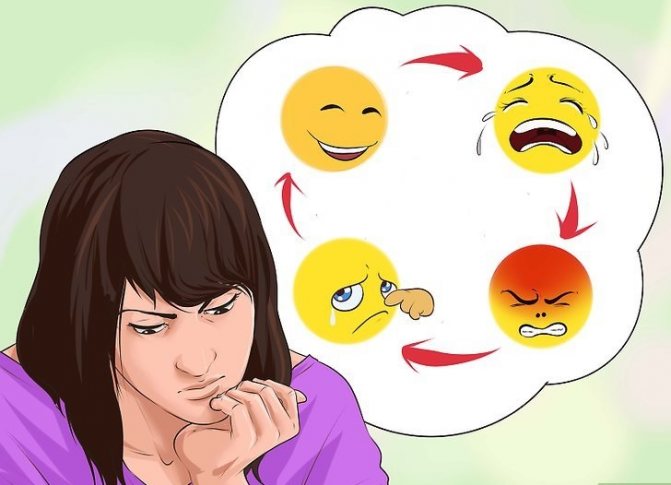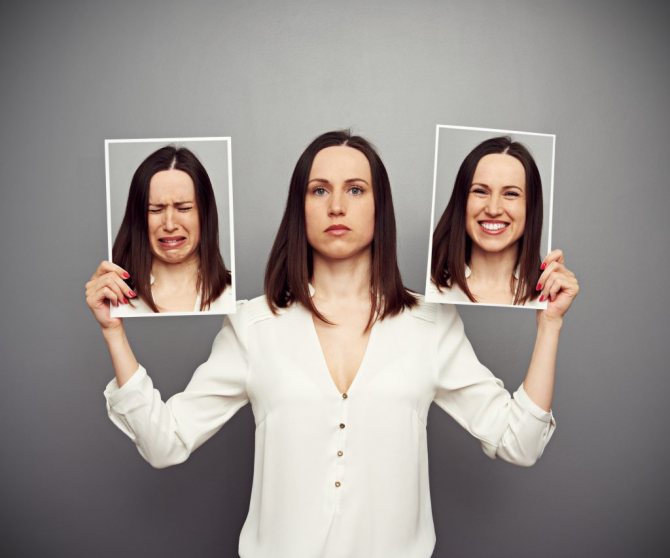Only recently you were in seventh heaven, but now you are angry. Your loved ones reproach you that you and your mood swings are simply unbearable. Be careful: this could be a sign of something serious!
It happens that we are not aware of our behavior at all. We don’t notice that at first we are joyful, full of enthusiasm, and a little later we are sad, sentimental, and tearful. We easily move from euphoria to anger, within one hour we manage to fall into hysterics and burst into bouts of hysterical laughter. We don't see a problem until someone points it out to us. Have you also heard about yourself that your mood is too changeable? Don't underestimate this.
“Emotional swings” are usually characteristic of women. They involve experiencing extreme emotional states. In men, they are very rare, moreover, such lightning-fast changes in mood are often difficult for them to understand, and can be the object of jokes and sarcasm. Meanwhile, the problem is not so trivial. Hormonal changes are responsible for mood swings - often, but not always: they can be caused by something else.
Stress and anger
Each person deals with them differently. For some it works out better, for others it works out worse. When stress begins to overwhelm you and you cannot find an outlet for negative emotions, mood swings are very likely to occur. For many people, the reaction to prolonged stress is precisely sudden changes in their emotional state. Some women either scream, or cry, or swear with their partner, or want to immediately be in his arms. To prevent this from happening, you need to give vent to your negative emotions in another way.
Depression
This is one of the most serious so-called diseases of civilization. According to the World Health Organization, more than 350 million people may suffer from depression! Despite its prevalence, we do not know very much about this disease. It often seems to us that depression manifests itself as a constant feeling of sadness, apathy, and an inability to have fun. This is true, but not only that. Sometimes depression manifests itself precisely as mood swings, and with a tilt towards negativity. Some people in this state can be angry, even aggressive, and overly loud. It should be remembered that this disease can and should be treated, it is not a reason for shame.
Addiction
Excessive use of alcohol and drugs (cocaine, amphetamines) can negatively affect your emotional state. This is because they initially cause a significant improvement in mood (it’s no coincidence that drugs are referred to as a high), increase energy, and boost self-esteem. But when the substances stop working, the person taking them may experience a feeling of complete depression. Remember that dependence on alcohol and psychotropic substances harms not only your physical health, but also your psyche.
Lack of sleep
Sleep is essential for the body to function properly. In this sense, he will not allow himself to be deceived. Sleeping until noon on weekends or in fits and starts throughout the week is wrong because it violates sleep hygiene. You need to rest regularly, 7-9 hours a day. Scientific research has confirmed that just one sleepless night already worsens a person’s psychophysical form. It has been noted that sleepless nights make us more aggressive. Lack of sleep primarily leads to mood disorders and emotional instability.
Bipolar disorder
This is a mental disorder from the affective group. People with this disorder often experience episodes of mania and depression. At first they are excited, hyperactive and excitable, but soon become depressed and “disconnect” themselves from the world. Typical symptoms of a manic episode include racing thoughts, decreased need for sleep, increased energy, hallucinations, and inflated self-esteem. Depressive episodes are characterized by decreased mood and self-esteem, problems with concentration, slowed thought processes, and thoughts of suicide. If you suspect this disease, you should consult a psychiatrist.
To get started, you can take a psychological personality test. famous American psychologist Albert Ellis.
Premenstrual syndrome
Are you worried that your mood swings may indicate an illness? But it could be “just” PMS. From some studies it follows that every second woman experiences premenstrual syndrome. Typical symptoms appear a few days before the start of your period and subside after it begins. In this case, in addition to mood swings, irritability, excessive appetite, headaches, chest pain, back pain, aggression, tearfulness, difficulty concentrating, sadness, swelling, a feeling of heat, fatigue, and vision problems are observed.
Menopause
The average European woman experiences this phenomenon at the age of 49. When the level of key hormones drops in a woman’s body, the body reacts to the decrease in a certain way. The disappearance of periods is one thing. Menopause also comes with other symptoms that can be quite distressing. We are talking, in particular, about mood swings, as well as hot flashes, insomnia, and excessive sweating. A decrease in the production of estrogen, the most important female hormone, is responsible for this. Sometimes menopause can begin prematurely and in its early version affect women under 40 years of age.
Other reasons
There are other reasons that can cause a sharp change in the emotions experienced. You may be surprised, but diet, for example, is responsible for our mood. In particular, sudden mood swings can be associated with excess caffeine and sugar. A head injury or brain tumor may also be responsible for extreme emotional states. Individuals with a borderline state, which is something between neurosis and schizophrenia, have a similar problem. The condition of such people is called stable instability. Typical for them are not only mood swings, but attacks of severe anger, unstable self-esteem, serious anxiety, lack of meaning in life, and aggression directed at themselves.
Tags: Depression
- Related Posts
- Treatment of phobias - the path to restoring mental health
- Spring depression
- Phobia is a threat to human health. Types of phobias.
« Previous entry
What is the danger
1. Changes in the level of hormones in the body.
Most often, mood changes sharply during periods of ovulation, menopause, before and during menstruation. In these cases, not only the emotional state of the woman changes, but also her feelings, behavior, and reactions. People tend to think that their feelings and thoughts are always rational and have specific causes. In fact, they can be influenced not only by environmental events, but also by changes in the level of chemicals in the body. People who experience frequent mood swings often have low levels of the hormones norepinephrine and serotonin.
2. Psychological fatigue. This happens often with women. “Overdoses” of information, vigorous, varied activity, and lack of proper rest can lead to exhaustion of the nervous system. A woman begins to feel that she cannot control her condition, various fears and phobias arise, etc. All this leads to more frequent mood swings.
3. Prolonged stress. If a stressful situation does not go away, the body's strength gradually runs out, and this leads to uncontrollable mood changes.
4. Other reasons, such as decreased self-esteem, feeling disconnected from other people, etc.
5. Mood swings can also be a sign of disorders such as anxiety disorder and bipolar disorder.
With an anxiety disorder, constant feelings of anxiety can lead to severe stress, which can cause your mood to change frequently and dramatically.
In bipolar disorder, mood changes spontaneously, at any time. But sometimes such changes can be caused by some events or situations that lead to sudden changes in mood, for example, insufficient night rest, crossing several time zones.
Yes, there are many reasons for women’s mood swings. But still, the main ones remain those that are associated with the cyclical nature of women. Let's take a closer look at them.
Mood swings occur in people of both sexes and all ages. They can be either a separate symptom or accompany a serious illness.
Here is a list of the most common reasons:
- genetic predisposition;
- hard physical labor;
- insufficient physical activity;
- chronic fatigue;
- depression;
- puberty;
- metabolic disease;
- mental disorders;
- frequent stress;
- endocrine diseases;
- taking oral contraceptives;
- use of psychotropic drugs;
- intoxication of the body due to the use of drugs or alcohol;
- brain injuries;
- Alzheimer's disease;
- neoplasms in the brain.
In some cases, mood swings occur due to weather changes. As a rule, this is observed in weather-sensitive people.
This is a chronic disease that can last for years. It is in first place among mental disorders that are manifested by constant mood swings. The pathology is characterized by alternating manic and depressive phases. During the first phase, a person is very active, curious, fixated on some ideas, smiling and in a good mood. During the depressive phase, he becomes passive, his mood worsens, and his activity is reduced to a minimum.
Read more: Bipolar affective disorder: causes of development, treatment
Among women
Statistics show that women experience mood swings more often than men. This is especially true for women living in megacities. From the point of view of psychologists, their pace of life is higher and they constantly experience severe mental stress. Representatives of the fair sex have to manage a lot - combining family, childcare and work. Additional stress can come from failed relationships, living with elderly relatives, and other factors.
Sudden mood swings in women are mainly caused by hormonal imbalance. This occurs during pregnancy and menopause, as well as during menstruation.
The female cycle has a great influence on the emotional state. Premenstrual syndrome is accompanied by short temper, irritability, and tearfulness. This is caused by increased production of estrogen and progesterone. PMS affects 60% of all women. It begins a few days after ovulation and ends with the onset of menstruation.
During pregnancy, numerous physical and emotional changes occur. They cause anxiety and fatigue. Along with this, hormones affect neurotransmitters.
Mood swings in women after 45 are a common phenomenon associated with the onset of menopause. A powerful restructuring is taking place in the female body. In particular, the level of estrogen, which affects the production of serotonin, is significantly reduced.
Frequent mood swings always lead to negative consequences. A person loses strength and desire to do anything, and the things he has started remain unfinished. Regular work takes much longer than usual. Often, the phenomenon ultimately leads to nervous exhaustion.
The immediate environment of such a patient also suffers, because he blames others for his problems. He is constantly overwhelmed by negative thoughts and emotions. In severe cases, a person goes to extremes and may even attempt suicide.
– hysterical disorder, manifested by superficial cognition and excessive theatricality of emotions;
– mixed states of mood disorders (lasting up to a week), characterized by the simultaneous presence of depressive symptoms and manic symptoms;
– cyclothymic disorder, which is a chronic pathology lasting 2 years, in which there is a fairly rapid switching from one mood to another;
– bipolar disorders, depressive moods, manifested in a sudden alternation of manic states (excessively elevated mood level) and depressive states (too low mood tone);
– a borderline state caused by the inability to build stable, adequate and long-term relationships with society.
The causes of sudden mood swings are divided into biological, psychological and environmental factors. The first are caused by changes in the levels of neurotransmitters (serotonin, dopamine), which are mood regulators.
The performance of neurotransmitters is disrupted when a degenerative pathology of an organic nature occurs (multiple sclerosis), with hormonal imbalance (diabetes mellitus), due to prolonged or excessive intake of psychoactive substances, for example, alcoholic beverages or narcotic drugs, when using drugs that directly affect the functioning of neurotransmitters or hormonal exchange (taking contraceptive drugs).
Psychological reasons are intertwined with biological abnormalities. Sudden mood swings can be caused by an anxiety disorder, stressors, nervousness or fatigue generated by certain circumstances (for example, the need to take an exam), or a confrontation with a traumatic situation.
Sudden changes in mood happen for various reasons. Much depends on the gender, age and health status of the person. Among the main reasons, experts usually name:
- Tendency to abuse alcohol;
- Gaming addiction and other types of painful, manic addictions (for example, addiction to watching television);
- Hereditary predisposition to mental disorders;
- Age-related hormonal changes;
- Long-term use of certain medications.
Also, a common cause of this problem lies in the improper upbringing of a person from childhood. Experts say that people who were not taught to manage their emotions as children suffer from mood swings much more often than patients who were taught from an early age to restrain their feelings.

Sudden changes in emotional background occur for various reasons.
Among women
If a woman or girl often changes her feelings from intense joy to tearfulness and sudden outbursts of anger, this may be a sign of incipient depression. The reason for changeability most often lies in dissatisfaction with marital or partner relationships, as well as inferiority complexes.
Attention! Emotional instability often occurs in early pregnancy as a result of hormone imbalance. Therefore, if a lady suddenly becomes capricious, it may make sense to buy a pregnancy test. If suspicions are confirmed, you can take any sedatives or vitamins, including folk remedies, only as prescribed by a doctor.
In men
Mood swings among the stronger sex are not uncommon. Most often, they are characteristic of those who have recently quit smoking, as well as those who actively abuse alcohol. A man suffering from alcohol addiction falls into joyful excitement before taking another dose of alcohol.
After drinking the drink, euphoria reaches its peak, and along with a hangover comes depression. If a smoking or drinking gentleman is forced to abstain from his “drug” for a long time, he may experience unexpected outbursts of anger and sharp transitions from joy, a calm mood to a state of passion. In this case, it is necessary to first treat the patient for his addiction.
In teenagers
- Hormonal changes. Fluctuations in hormones during the menstrual cycle, at the onset of menopause, during pregnancy, adolescence. The influence of the phases of the moon on a person’s mood.
- Stress, especially in large cities.
- Mental disorders: affective, bipolar, anxiety.
- Bipolar - when the mood changes sharply from depressive to euphoric and back - colossal, very noticeable changes. Anxious – characterized by persistent anxiety not caused by objective events.
- Low self-esteem, social isolation.
- Moral exhaustion, fatigue from too many things to do. Huge flow of information, lack of time for rest and relaxation.
- Changes in weather (sunny, rainy, frosty, etc.).
What to do if there are sudden mood changes
In most cases, mood swings come and go. These are often transient fluctuations that do not require special care, for example, they are associated with a woman’s menstrual cycle (the mood should return to normal within a few days).
However, if you frequently have sudden and unexplained mood changes or suffer from a psychopathological mood disorder characterized by affective lability, you may benefit from one or more of the following treatments.
Natural Methods:
- Consumption of phosphorus and magnesium . These two substances, present in food and water, help regulate mood.
- Nutrition , with the help of diet, you can compensate for some body deficiencies and help restore normal mood. Carbohydrates, milk and dairy products tend to stimulate the production of serotonin, fish and crustaceans contain a high percentage of tyrosine, an amino acid that helps keep stress under control, fruits can be an excellent source of sugars and energy, as well as vitamins and minerals, and so Thus, they are seen as an excellent alternative to chocolate. Also, certain types of spices, such as chili pepper, oregano and marjoram, can be very useful in maintaining a high tone of mood.
- Physical activity , for example running, which helps regulate brain activity and, therefore, normalize emotional states.
Drug therapy
Among the most common medications are lithium salts . These are medications that act on mood by introducing lithium into the blood.
Its dosage varies depending on the severity of the condition, and is always accompanied by frequent blood tests to check the presence/amount of the drug in the body, and attention to nutrition (regarding, for example, the amount of salt, caffeine and theine in food, which can cause side effects, such as nausea, blurred vision, tremors, etc.).
Psychotherapy and psychological counseling also provide effective assistance. Some types of psychotherapy may be based, for example, on uncovering the unconscious causes of mood swings (psychoanalysis), others on studying the disorder (systems-relational approach), and others on understanding the processes that underlie mood changes.
Identifying Mood Swings
Sometimes the mood changes frequently, for no apparent reason. In this case, the term “difference” can be used. Also in science, the concept of “cyclothymia” is used, this is the name given to the tendency to sudden changes in mood. This psychological disorder is characterized by the following symptoms:
- Alternation of increased excitement with apathy;
- Periods of high levels of performance are followed by times when a person has no motivation at all for any meaningful activity;
- A person constantly experiences difficulty concentrating and cannot concentrate on even the simplest things (in severe cases, patients are even forced to quit work or study because of this);
- Periods of increased sociability alternate with times when the patient wants to isolate himself from the outside world and lives in isolation and solitude.
Another scientific name for wave-like changes in mental mood is cyclothymia, since this disorder is characterized by cyclical changes. It is known that at certain periods of life people are more likely to suffer from cyclothymia. Such periods include pregnancy, adolescence and the so-called “midlife crisis”.

Frequent mood changes are characteristic of people with unstable psyches
Feeling brain foggy

Brain fog is associated with poor concentration, memory loss, and for many women, it's not just a sign of aging. The reason for this is hormonal imbalance. This is due to low estrogen levels, which increases a woman's risk of developing Alzheimer's disease.
“Olga” from the series of the same name: the tragic fate of actress Yana Troyanova
A broken nail is no problem: tips for treating nails at home
Sometimes we wear a bra incorrectly: ways that are harmful to health
The dangers of frequent mood swings
Changing moods can be a symptom of a serious illness. However, do not panic ahead of time. It is quite possible that the frequent transition from intense joy to tears, anger and a depressed state is just a specific property of a particular person. In some absolutely healthy people, emotions often jump from anger to joyful euphoria. Most often this happens in choleric and melancholic people.
This condition requires immediate intervention from a specialist if:
- A person suddenly becomes suicidal;
- Along with rapid changes in mood, signs of manic-depressive psychosis are observed;
- During periods of depressed, depressed state, the patient is prone to constant harm to himself and others;
- Wave-like changes in women arose against the background of prolonged postpartum depression.
In these cases, it is urgent to show the person to a psychotherapist. Married couples can visit a specialist together; Family psychological assistance gives good results. Timely treatment will help prevent the negative consequences of the disorder.

If your mood changes suddenly and unexpectedly, you should consult a specialist.

A tendency to cyclothymia can have a negative impact on a person’s mental and physical health.
If a patient experiences rapid changes in emotions, it is important to find out why this is happening. When a person constantly “throws from one extreme to another” (from the most complacent mood to anger or depression), this may be a sign of an incipient illness, mental or physical. Only a specialist in psychology can diagnose the disease and deal with the disorder, so you should not postpone a visit to him.

The main symptoms are inappropriate behavior and unpredictability of actions. In a person, sudden aggression can be replaced by a depressed state, and fun and joy can be replaced by sadness and tears.
If this happens, you should immediately visit a specialist and get qualified help. Otherwise, the situation will get out of control, and the person may harm himself and his environment. After all, constant stay in this state leads to severe fatigue and depresses the psyche. It is difficult for the body to withstand such a load.
External influences on mood
Changes in a woman’s mood can also be influenced by external factors, such as, for example, the weather, phases of the lunar cycle. In the off-season, when there is little sunlight, frequent rains, fog, slush and grayness outside the window, you just want to be sad, mope, and sometimes cry for no reason. Doctors attribute such mood swings to a lack of light and fresh air, as well as a low content of vitamins in food.
The second important external factor influencing a woman’s mood is the lunar cycle. Such an influence may immediately “smell” of something mystical and incomprehensible, perhaps because this direction has not yet been sufficiently studied. But observations of many women have shown that this connection actually exists. Most often, the waxing moon brings more strength, a lot of energy, new ideas, and, accordingly, an elevated mood for their implementation. The peak of vitality occurs during the full moon. And on the new moon, on the contrary, the most obvious loss of strength is observed.
Of course, it is not at all necessary that you will clearly feel broken at the end of the lunar cycle and blooming closer to the full moon. But if you decide to observe yourself, you will notice patterns that repeat every month. Including in the mood.
If the lunar minimum - the new moon - coincides with your physiological minimum - menstruation - you get a double loss of strength and mood. But then, when the maximums coincide - the full moon and ovulation - we get fireworks of emotions, extreme performance and a “flying” mood.
Ideally, of course, the physiological and lunar cycles should be balanced - the lunar maximum (full moon) coincides with the physiological minimum (menstruation), and vice versa. Thus, a woman’s emotional background becomes relatively smooth throughout the month, and sudden mood swings can be avoided. Experts say that this is exactly what wise nature intended, but now “failures” are becoming more common.

External factors can also influence a woman’s mood changes. For example, weather conditions, periods of the lunar cycle. In autumn, when there is little sunshine, and outside the window there is bad weather, fog, dampness, heavy rains, you just want to be sad for no reason, sometimes even cry, apathy and laziness arise.
Doctors explain that such mood swings are associated with a lack of sunlight and fresh air, and a low content of vitamins in food.
An important external factor influencing a woman’s emotional state is the lunar cycle. This phenomenon has not been sufficiently studied and may seem like a mystical, incomprehensible fact. However, it is known that this connection actually exists, and this is confirmed by the observations of many representatives of the fair sex.
Usually, during a waxing moon, people have more strength, energy, activity, many ideas, new projects and plans come, their mood rises, and an incentive arises to carry out their plans.
On the full moon there is a peak in vitality, and vice versa - on the new moon you can observe a decline in vital energy. It is not necessary that a woman will feel unwell and depressed at the end of the lunar cycle and be blooming and full of strength closer to the full moon. But if you observe yourself, you will notice monthly recurring patterns.
When the new moon coincides with the physiological minimum for women - menstruation - the fairer sex feels a loss of strength and a bad mood. However, when the full moon coincides with ovulation in a woman, she receives a waterfall of emotions, increased performance and a great mood. At this time you just want to flutter around, your health improves.
Divide and rule
In order not to treat a disease of the liver or endocrine system with the help of psychoanalysis, or depression with surgery, it’s worth figuring out what’s what.
Vlada Titova
, psychiatrist, candidate of medical sciences, explains why psychologists cannot be blamed for negligence and unprofessionalism: “A psychologist cannot recognize the symptoms of endocrine or other disorders simply because this is not within his competence. Just like endocrinologists are not taught to treat caries, and gynecologists are not taught to relieve clients from depression. Moreover, without the consent of a doctor, a psychologist does not have the right to diagnose a mental disorder. After all, he is a psychologist, not a psychiatrist.” It often happens that even an experienced psychotherapist or psychiatrist does not immediately recognize the symptoms of diseases. Because they successfully disguise themselves as emotional or even mental disorders. Of course, there are other signs by which the disease is diagnosed. But often they fade into the background, becoming invisible to the person himself. In the initial stages of the disease, there may simply be no other symptoms other than emotions.
It is clear that it is simply impossible to remember all the signs of physiological diseases that can cause changes in the psychological state. And if, with every mood swing, you look for similar ones in the medical encyclopedia, you are not far from hypochondria. You need to assess the state of your body as a whole, without separating psychology and physiology. Remember when you first noticed some emotional changes in your behavior. Now think: how has your body changed during this time? Even minor signs, such as dry skin (not typical for you before and not associated with the cold season), can be the key to solving what is really happening to you and how to treat it.
It is important to remember: psychological problems arise in connection with certain external circumstances. Yes, these circumstances may be implicit, or a person suppresses memories of them, but most often he at least guesses about their existence. For physical illnesses, it is not so important whether your boyfriend left you or whether there are problems at work. Therefore, if you clearly feel changes in your emotional state, but do not see any reasons for mood swings, you should first consult an experienced doctor - a therapist, neurologist or endocrinologist, and also do a biochemical blood test.
TEXT: Pavel Koshyk
Only recently you were in seventh heaven, but now you are angry. Your loved ones reproach you that you and your mood swings are simply unbearable. Be careful: this could be a sign of something serious!
It happens that we are not aware of our behavior at all. We don’t notice that at first we are joyful, full of enthusiasm, and a little later we are sad, sentimental, and tearful. We easily move from euphoria to anger, within one hour we manage to fall into hysterics and burst into bouts of hysterical laughter. We don't see a problem until someone points it out to us. Have you also heard about yourself that your mood is too changeable? Don't underestimate this.
“Emotional swings” are usually characteristic of women. They involve experiencing extreme emotional states. They are very rare in men; moreover, such lightning-fast changes in mood are often difficult for them to understand and can be the object of jokes and sarcasm. Meanwhile, the problem is not so trivial. Hormonal changes are responsible for mood swings - often, but not always: they can be caused by something else.
Stress and anger
Each person deals with them differently. For some it works out better, for others - worse. When stress begins to overwhelm you and you cannot find an outlet for negative emotions, mood swings are very likely to occur. For many people, the reaction to prolonged stress is precisely sudden changes in their emotional state. Some women either scream, or cry, or swear with their partner, or want to immediately be in his arms. To prevent this from happening, you need to give vent to your negative emotions in another way.
Depression
This is one of the most serious so-called diseases of civilization. According to the World Health Organization, more than 350 million people may suffer from depression! Despite its prevalence, we do not know very much about this disease. It often seems to us that depression manifests itself as a constant feeling of sadness, apathy, and an inability to have fun. This is true, but not only that. Sometimes depression manifests itself precisely as mood swings, and with a tilt towards negativity. Some people in this state can be angry, even aggressive, and overly loud. It should be remembered that this disease is possible and not a reason for shame.
Addiction
Excessive use of alcohol and drugs (cocaine, amphetamines) can negatively affect your emotional state. This is because they initially cause a significant improvement in mood (it’s no coincidence that drugs are referred to as a high), increase energy, and boost self-esteem. But when the substances stop working, the person taking them may experience a feeling of complete depression. Remember that dependence on alcohol and psychotropic substances harms not only your physical health, but also your psyche.
Lack of sleep
Sleep is essential for the body to function properly. In this sense, he will not allow himself to be deceived. Sleeping until noon on weekends or in fits and starts throughout the week is wrong because it violates sleep hygiene. You need to rest regularly, 7-9 hours a day. Scientific research has confirmed that just one sleepless night already worsens a person’s psychophysical form. It has been noted that sleepless nights make us more aggressive. Lack of sleep primarily leads to mood disorders and emotional instability.
Bipolar disorder
This is a mental disorder from the affective group. People with this disorder often experience episodes of mania and depression. At first they are excited, hyperactive and excitable, but soon become depressed and “disconnect” themselves from the world. Typical symptoms of a manic episode include racing thoughts, decreased need for sleep, increased energy, hallucinations, and inflated self-esteem. Depressive episodes are characterized by decreased mood and self-esteem, problems with concentration, slowed thought processes, and thoughts of suicide. If you suspect this disease, you should consult a psychiatrist.
To get started, you can go through. famous American psychologist Albert Ellis.
Premenstrual syndrome
Are you worried that your mood swings may indicate an illness? But it could be “just” PMS. From some studies it follows that every second woman experiences premenstrual syndrome. Typical symptoms appear a few days before the start of your period and subside after it begins. In this case, in addition to mood swings, irritability, excessive appetite, headaches, chest pain, back pain, aggression, tearfulness, difficulty concentrating, sadness, swelling, a feeling of heat, fatigue, and vision problems are observed.
Menopause
The average European woman experiences this phenomenon at the age of 49. When the level of key hormones drops in a woman’s body, the body reacts to the decrease in a certain way. The disappearance of your period is one thing. Menopause also comes with other symptoms that can be quite distressing. We are talking, in particular, about mood swings, as well as hot flashes, insomnia, and excessive sweating. A decrease in the production of estrogen, the most important female hormone, is responsible for this. Sometimes menopause can begin prematurely and in its early version affect women under 40 years of age.
Other reasons
There are other reasons that can cause a sharp change in the emotions experienced. You may be surprised, but diet, for example, is responsible for our mood. In particular, sudden mood swings can be associated with excess caffeine and sugar. A head injury or brain tumor may also be responsible for extreme emotional states. Individuals with a borderline state, which is something between neurosis and schizophrenia, have a similar problem. The condition of such people is called stable instability. Typical for them are not only mood swings, but attacks of severe anger, unstable self-esteem, serious anxiety, lack of meaning in life, and aggression directed at themselves.
The symptom is classified into three large groups (depressive and bipolar disorders, cyclothymia), each of which also has several varieties. Types of pathology are distinguished by origin, nature of the course, severity of symptoms and the presence of manic tendencies.
Cyclothymic mood swings
Affective mental disorders, which may contain symptoms of hypothymia (low mood) and hyperthymia (pathologically elevated mood).
Hypotymia occurs with the following symptoms:
- low self-esteem;
- apathy and indifference to everything;
- memory and attention disorders;
- sleep disorders;
- irritability;
- lack of motivation;
- guilt, self-flagellation.
Signs of hyperthymia:
- hyperactivity and energy;
- short periods of sleep;
- excessive excitability;
- increased talkativeness;
- performance disorders;
- increased euphoria.
Depressive mood swings
They may appear temporarily or last for many years. They arise as a symptom of a chronic disease or appear as a reaction to stressful situations, medications, or surgery. There are different types of depression:
- Clinical. A widespread disorder that is difficult to treat. Potent antidepressants are usually used in combination with other treatments.
- Small. It has signs of a clinical form of pathology, but is amenable to restorative therapy. Lasts 1-3 weeks, with successful treatment it goes away without consequences.
- Atypical. It is characterized by psycho-emotional disorders, as well as changes in appetite, sleep, behavior, and weight.
- Postpartum. Occurs in women after childbirth. May appear regardless of emotional stability and character. Usually the shape is affected by hormonal imbalances in the body.
- Dysthymia. A chronic form of the disorder that can last 1-3 years. It is expressed in a constantly bad mood, indifference, and low self-esteem.
Who are cyclothymics
There are 2 cycles that can affect a woman's emotional mood. A girl who is about to menstruate can be easily identified by her emotional state. She does not control her emotions, often cries, and gets irritated for any reason. This is easily explained if you understand physiology.
The menstrual cycle indicates that during this period the egg preparing to become a fetus did not survive. It doesn’t matter whether a woman dreams of a child or not. Nature works in such a way that the instinct of motherhood is embedded in a woman’s subconscious.
Ovulation is a chance for new life to be born. During this period, women are very attractive, as if they radiate inner light. They feel a desire to be beautiful people and strive to take care of their appearance.
The girl becomes more attractive, charming, her sexual energy increases, an attraction to the stronger sex arises, and a desire to please a man. The influence of lunar cycles on women occurs in different ways. This depends on the location of the Moon in the zodiac sign, as well as on the amount of energy of the Moon and its relationship with a given planet.
Typically, during the waxing and full moon periods, there is a surge of energy, and the new moon is considered the period of greatest loss of energy.
There are certain days - Ekadashi. This is the 11th day following the new or full moon. These days are difficult, there are many conflicts, irritations, omissions, and lack of mutual understanding between people. It is best to fast on such a day or abstain from meat and legumes.
Nature made sure that both cycles were balanced, and people psychologically endured these periods more easily. During the new moon, ovulation occurs in a woman’s body. And on the full moon - menstruation. Ideally, your cycles should coincide, but for many women this does not always happen.
Keep in mind! Incorrect mixing of cycles leads to sharp fluctuations in mood and energy, which does not bring joy to the woman and her loved ones. It is noted that even the harmonization of these cycles does not provide an even mood. There are times when a woman is sad and wants to give vent to tears.
You can keep a cycle diary and note the status and cycle of your menstruation every day. After a few months, patterns will begin to emerge. Predictions will benefit the woman and her close circle. You can most likely get a forecast of days that affect mood swings.
Cyclothymics are people with an unstable psyche. One person combines seemingly incompatible traits. Sociability and cheerfulness coexist with increased irritability, embitterment, and a desire to oppose oneself to the world around us. Cyclothymics are also characterized by the following personal characteristics:
- Increased anxiety and excitability, tears for any reason;
- Severe irritability;
- Difficulty concentrating, memory problems, especially in old age;
- There may be subtle disturbances in speech and motor coordination caused by improper functioning of certain parts of the brain;
- Constant feelings of guilt for uncontrollable outbursts of anger and agitation.
Also, cyclothymic people tend to attach too much importance to details and insignificant events, to fix their attention on trifles; therefore, even the smallest incident can cause a sharp change in mood, an unexpected attack of excitement or, conversely, depression.
During periods of increased excitement, cyclothymics communicate a lot and can easily find a common language with people. However, when the mood suddenly changes, the person becomes completely different: withdrawn, silent, focused on his own feelings and experiences. Therefore, such people, as a rule, have very few friends. They communicate mainly with relatives who are tolerant of such changes in mood.
Cyclothymia itself is not dangerous. However, if you do nothing and ignore these negative changes for a long time, they can cause destructive processes occurring in the patient’s psyche. Therefore, any person subject to changeable emotions should be attentive to their own condition.

Dealing with a cyclothymic is not easy
It is quite difficult to argue with nature, no matter how much you would like to. A woman’s physiological, or menstrual, cycle affects her life, including mood changes. The scientific term “premenstrual syndrome,” or simply PMS, in real life manifests itself as increased irritability, nervousness, tearfulness, and constant emotional swings.
That is why a woman who is about to menstruate can be seen with the naked eye - a kind of vixen for whom everything is wrong and everything is wrong. Of course, this is an exaggerated image, each representative of the fair sex experiences PMS in its own way, each knows how to restrain or, conversely, release their emotions differently, but still the general principle of the action of this factor is clear.
Why is this happening? If you look at it from a physiological point of view, PMS is a consequence of hormonal changes in the body. The egg is not fertilized, it dies and leaves the body during menstruation. Experts say that before the onset of menstruation, a woman’s body does not have enough strength to maintain emotional balance.
If you look from the point of view of subtle matters, then everything here can also be easily explained. The onset of menstruation means that conception did not occur in this cycle. The egg that could have become a child died. And it doesn’t matter at all whether you want children at the moment or not. The subconscious natural desire to become a mother still manifests itself, at least in the form of PMS.
This theory is confirmed by the fact that during ovulation a woman becomes prettier, her desire to take care of herself and look beautiful and elegant increases. A woman’s sexual energy, charm and attractiveness increases. Probably, many of us have noticed that during the ovulation period we want to fly with happiness, and, in contrast to this state, before and during menstruation there is complete apathy and depression. Perhaps this is what wise nature intended?
Mood swings - how to limit their impact
Here are some simple things you can do to limit the impact of mood swings.
“None of us can influence the pandemic, but each of us has the power and ability to influence our own individual response to the situation,” says Bijlani.
Don't sweat the small stuff
Confining yourself to the confines of your home means losing your usual sense of perspective. This means that we can be upset or disappointed by things that wouldn't normally bother us.
Even if something seems incredibly important, stop. Notice how you feel and then intentionally let it go. Do or think about something completely different, and chances are that in a few hours it will no longer be so important to you.
Stick to Healthy Habits
If you can get outside for daily exercise, you may find that it helps restore your mood. However, yoga, Pilates or indoor dancing can also help alleviate negative emotions.
Prioritize your sleep schedule, eat healthy foods, and try to avoid drinking too much alcohol.
“The best way to keep mood swings under control is to take care of yourself by maintaining a regular sleep schedule, healthy eating, exercise and other activities. If your doctor has prescribed you medication for mental health, take it as directed.”
Keep a diary
Some people find that writing down their feelings helps them organize their emotions. This can be especially helpful if you experience anxiety.
“Write down your worries and divide them into two groups: problems that you can actually solve here and now; and that which concerns the more distant future, over which we have no control. Focus only on the first ones
Do good deeds
Choose kindness and you may very well start to feel better. Doing something nice for someone else can help improve your mood as well.
Hope for the best
Ultimately, finding the good times during these difficult times will help you stay in a good mental state. Spend some time each day thinking about the things you are grateful for.
– Hope is incredibly important.
Many will experience fear during this time. Confidence that this situation will pass - and it will pass! – will give you the feeling that there is a future behind all this. Plan how you will celebrate and celebrate when this is all over. Video from psychologist Sergei Klyuchnikov. Mood swings.
Symptoms
This state is similar to a natural emotional reaction that occurs during crises, nervous breakdowns and frequent failures in life. During such periods, a woman experiences emotional depression, malaise and loss of strength. She suffers both mentally and physically.
Medical professionals and psychology experts say that mood swings are spontaneous and can occur under inappropriate conditions.
There are not many signs of a violation, but they are easy to notice:
- lack of appetite;
- instant, groundless change of mood that has no reason;
- appetite disorders. A woman may give up her favorite dishes and eat foods she has never tried before;
- sleep disturbance;
- chronic fatigue and weakness;
- apathy and melancholy for no apparent reason;
- loss of a sense of self-worth and self-confidence;
- irritability.
If such conditions do not go away within 30 days or a longer period, the woman needs the help of a specialist. If you do not undergo timely treatment, the pathology will begin to progress, and in this case it will be more difficult to get rid of it.
How to stabilize the condition
To return the cyclothymic to normal life and bring him out of unexpected depression or euphoria, family and friends should consult with a specialist as soon as possible. It happens that a patient wants to be treated, but is afraid of meeting with a psychotherapist out of a false sense of shame. In this case, anonymous treatment in a private clinic can be recommended.
When a person has a sudden mood swing, the main task of the specialist who works with this problem is to stabilize the patient’s condition as quickly as possible, without resorting to potent medications if possible. For this purpose, such means as testing, conversations with the patient, performing special relaxation exercises, and auto-training are used. Group and individual art therapy gives good results. Cyclothymics find it very useful to express their emotions through creativity.
If the patient’s condition is so severe that his presence in society can cause harm to others (for example, an outburst of unmotivated aggression over a long period of time), the doctor may suggest hospitalization of the patient. Typically, 10-day treatment is enough to stabilize the condition.
How to deal with mood swings
Emotions appear against a woman’s will, so it is not easy to consciously control them. You shouldn’t suppress your emotions when your mood changes; first you need to make your reaction to them weaker.
1. If you feel that your mood has begun to change dramatically, stop doing what you were doing before. Try to understand what exactly upsets you, whether you currently have objective reasons for negative emotions. Perhaps your bad mood is a normal reaction to recent events?
2. When your mood worsens, try to be alone with yourself if possible. Even a few minutes of solitude will help you collect your thoughts, get distracted and not do something under the influence of emotions that you will later regret.
3. Play with your emotions. Yes, yes, just play! If you feel a wave of negative mood, do not suppress your emotions, but at the same time try to appear calm and joyful on the outside. By imitating positive emotions, while giving free rein to the negativity inside, you will soon feel that managing your mood is not so difficult.
4. Practice breathing exercises, drink water in small sips when you cannot cope with the surging wave of negative emotions and remain calm. If possible, take a walk in nature.
5. Play sports. Both active and calm sports will help bring the psyche into a stable state.
6. Chat with friends and like-minded people. Pleasant, unobtrusive communication in a warm female circle will help lift and harmonize your mood.
7. Get healthier: choose the right diet, optimize your work and rest schedule, start doing yoga and meditation, take relaxation massage courses.
8. Enrich your life with new experiences: allow yourself cultural recreation more often, get yourself a new hobby, get carried away by something interesting. It doesn’t matter what it will be - needlework, caring for fish in an aquarium, skydiving or driving a car. The main thing is that all this will help you lift your mood and less likely to “slide” into negativity.
9. Within reasonable limits, you can use homeopathy, herbal medicine, and traditional medicine. If you feel that you can’t cope on your own, sometimes you can’t control yourself, consult a doctor for professional help. You may have to visit not only a psychologist, but also a neurologist, endocrinologist, gynecologist, and therapist. Timely, qualified help will help bring both health and mood back to normal!
Remember that a woman has the power not only to improve her mood, but also to lift it for others! The main thing is to understand the causes and consequences.
“Rejoice in life, shine, radiate light and be happy!” Anna Kutyavina
Mood swings appear regardless of the girl’s wishes, so it is difficult to keep control over them. You shouldn’t suppress your emotions during mood swings—you first need to weaken your reaction to them.
For this, the following tips are given:
- a person suffering from mood swings himself notices when his moral state changes. However, a sharp drop can be avoided. Stop what you're doing and review recent events. Perhaps the reasons for the disorder are quite simple: a bad mood manifested itself as a reaction to the events that happened the day before;
- When your mood worsens, try to be alone. Even a few minutes of solitude will help you comprehend the situation, distract yourself and, under the influence of emotions, not commit rash actions, which you will later regret;
- You shouldn't control your emotions. If you don't throw them out, it will only get worse. However, you should not take it out on others. Throw out all the negativity inside, while trying to maintain a positive attitude at least externally. Gradually learn to manage your condition and begin to cope with sudden mood swings;
- You should practice breathing exercises and drink small sips of water if you cannot cope with negative emotions and remain calm. If possible, take a walk in nature, to the park, breathe fresh air;
- need to do sports. Both calm and active types of sports activities can bring the psyche back to normal;
- Communication with friends and associates with similar interests will be beneficial. A quiet time among loved ones can support a woman and lift her spirits;
- start improving your health. Maintain proper nutrition, regulate work and rest. Do meditation, yoga, sign up for massage sessions;
- try to get a lot of new impressions. Go to cultural events, find a new hobby. Let it be knitting, sewing, breeding fish in an aquarium, car driving courses or skydiving. This will help improve your mood and reduce negative reactions;
- If possible, use traditional medicine, herbal medicine, homeopathy. When you realize that it is difficult to cope and control yourself, you should seek help from specialists.
Remember that a woman can improve her mood and lift it to other people. It is important to understand the reasons.
Prevention and treatment
Prevention of behavioral deviations is proper upbringing from infancy, attention to the emotional needs of the child, treating him as an individual, respecting his views and preferences. Consistency and coordinated actions of the parents are no less important (what the father forbade, the mother does not allow), otherwise the child will learn resourcefulness and opportunism from an early age, which will negatively affect his mental development.
The age of puberty requires special attention and effort from parents. At this time, the child must be treated as an adult, respecting his right to choose friends, extracurricular activities, music, clothing, and entertainment. At the same time, it is necessary to stipulate prohibitions and restrictions, clearly explaining why they are necessary. This way, parents will be able to develop a trusting relationship with a teenager and go through a difficult age together, without traumatizing the immature psyche of the matured child.
A simple but effective means of preventing and treating mood swings in adults and children are adherence to diet, sleep, work and rest, moderate physical activity, and spending time in the fresh air. Automotive training techniques, meditation, and yoga will help normalize the psycho-emotional background and restore mental balance after experiencing stress, conflict, and troubles. Food rich in vitamins and microelements has a beneficial effect on the nervous system and the general condition of the body.
In cases of stable problems with emotional mood, they resort to the help of sedatives, nootropics, antidepressants, and tranquilizers. These medications belong to the group of potent drugs, some are addictive, so it is unacceptable to use them yourself.
You can often hear complaints: someone has spent a lot of time and money communicating with psychologists, but has not gotten rid of depression, irritability, anxiety and frequent mood swings. In fact, sometimes emotions are literally caused by illness. In this case, it is important to contact a physician, surgeon or endocrinologist in a timely manner.
When to see a doctor
Timely assistance is needed in the following situations:
- if this condition occurs more than 2 times a week and lasts for a long time;
- a woman experiences discomfort from her emotional state, and at the same time her well-being is disturbed and her health deteriorates;
- deviation provokes conflict situations and quarrels with loved ones and work colleagues.
Mood swings are a rather unpleasant condition that causes trouble for the woman herself and those around her. It is not recommended to ignore these violations, as they can lead to serious mental problems. If you wish, everything can be corrected, and then life will sparkle with bright colors again.









